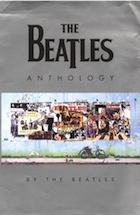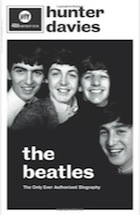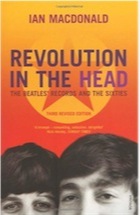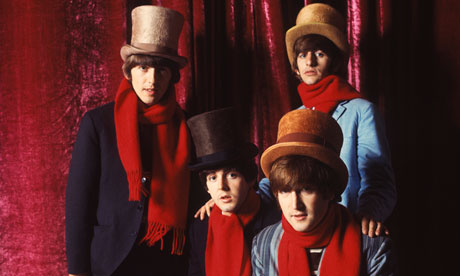The best books on the Beatles
Fifty years after their first single was released in Britain, John Harris considers which books on the Beatles have stood the test of time – and what to look out for in the future
John HarrisThe Guardian, Wednesday 26 September 2012
Modern pop is built on the denial of time. Reunions extend into the distance; the way we now listen to music means that songs from the distant past constantly jostle with songs from the present. With the increasing number of pop veterans, there is an inevitable fondness for nipping and tucking away the signs of their advancing years and inviting audiences into a huge suspension of disbelief – for a moment it can once more be 1956, or 1967, or 1989 …
Now and again, though, an occasion arrives that decisively reminds us how old post-Elvis popular culture now is – 5 October is the 50th birthday of the Beatles' first single, released back when Harold Macmillan was the PM, and the Cuban missile crisis was only weeks away.
"Love Me Do" sounds like the world in which it was made: tentative, still feeling the pinch of post-war austerity. Ian MacDonald's wonderful song-by-song history of the group, Revolution in the Head, reckoned that the song's "modal gauntness" is subtly cunning, serving notice of the Beatles' "unvarnished honesty", and – via John Lennon's wailing harmonica part – the "blunt vitality" of their native Liverpool. In the surviving Beatles' own account, the huge Anthology, Paul McCartney recalls that the song was meant to sound hard and authentic: "blues" rather than "la de da de la".
Many Beatles books barely mention "Love Me Do" at all. But there it is: a number 17 hit, long rumoured to have been propelled into the charts thanks to bulk-buying by manager Brian Epstein. If, like me, one of your first experiences of Beatles music was the collection 1962-66 (known as "The Red Album", as against 1967-70 "The Blue Album"), you will probably have experienced it as a strangely muted opening to a listening experience that quickly flared into spectacular life: a prologue, rather than a first chapter proper.

The Beatles' second single, "Please Please Me", was released in January 1963, in the midst of a legendarily biting British winter, to which its giddy sound was an antidote. "Congratulations, Gentlemen, you've just made your first number one," said their producer, George Martin. And he was right. By early the following year, their songs were crowding the US charts, and they were about to play to 73 million Americans onThe Ed Sullivan Show. Once again, they were adopted as a panacea for cold and grim times – this time less a matter of the weather than the pall cast by the murder of President Kennedy. Only two years later, they would reach the apex of their fame, chased around the Deep South by fundamentalist Christians outraged by John Lennon's claim that they were "bigger than Jesus", while their music took on the textures and expanded horizons traceable – at least in part – to Lennon and George Harrison's use of LSD.
Such is the remarkable pace of a story that has been told by scores of writers, a story about four young musicians but no end of other things: the cities of Liverpool, Hamburg and London; class, and the shaking of English hierarchies; pop's transmutation into a global culture; and the western world's passage from a world still defined by the second world war and its aftermath, to the accelerated modernity we know today. Everything in the tale pulses with significance and drama. It seems barely believable, and in the best Beatles books, it still burns.
Philip Norman's Shout! was first published in 1981, and remains a glorious example of how to write about music, while also writing about much more. Of the Beatles in the mid-1960s, and their phenomenal success a mere three years or so after "Love Me Do" appeared, he wrote this:
"Only in ancient times, when boy emperors and pharaohs were clothed, even fed with pure gold, had very young men commanded an equivalent adoration, fascination and constant, expectant scrutiny. Nor could anyone suppose that to be thus – to have such youth, and wealth, such clothes and cars and servants and cars – made for any state other than inconceivable happiness. For no one since the boy pharoahs … had known, as the Beatles now knew, how it felt to have felt everything, done everything, tasted everything, had a surfeit of everything; to live on that blinding, deadening, numbing surfeit which made each, on bad days, think he was ageing at twice the usual rate."
Thanks to an obsession that began when a babysitter played me a Beatles record around the time of my fifth birthday, I own 67 books about the band (before I wrote this article, I counted them). They range from the crass and moronic, via the comically arcane, to the serious and brilliant. Among them, there is an American volume titled The Walrus Was Paul, all about the insane late 60s conspiracy theory in which McCartney had been dead since 1966 and secretly replaced by a doppelganger. If I'm feeling really masochistic, I occasionally pick up The Day John Met Paul, an absurd and thoroughly speculative minute-by-minute account of the day in 1957 when Lennon first encountered McCartney at a church fete.
I treasure an American hardback of The Longest Cocktail Party, the memoir of a long-lost American called Richard DiLello, who worked for the Beatles' doomed and decadent Apple company as a PR assistant and "house hippy". And at least once a year, I reread Barry Miles's Many Years From Now, an account of McCartney's 60s that, thanks to voluminous input from its subject, reads more like a memoir, and a brittle one at that. Every few pages, McCartney decides to pick a Lennon-McCartney composition, and then specify each of their contributions: "In My Life", long assumed to be Lennon's work alone, was "my melody … my guitar riff"; when it comes to "Ticket to Ride", "because John sang it, you might have to give him 60% of it."
That book was a transparent response to the posthumous Lennon industry, the most compelling product of which is Lennon Remembers, the full transcript of the 1970 interview he granted to the founder of Rolling Stone magazine, Jann Wenner. Lennon Remembers is defined by the bitterness and candour of a mind trying to make sense of Norman's "deadening surfeit", lashing out at former colleagues and associates, and describing the distance between the good clean fun portrayed by just about every newspaper journalist who travelled with them, and what actually happened. "When we hit town, we hit it," he told Wenner. "We were not pissing about. There's photographs of me crawling about in Amsterdam on my knees, coming out of whorehouses and things like that. And people saying [cheerfully]: 'Good morning, John.'"

At the time the interview happened, there were only two Beatles books of any quality. Hunter Davies's authorised biography was published in 1968, admirably researched and brimming with access – but stymied by his artless prose, and the constraints of being the band's in-house writer. There was also the Penguin paperbackLove Me Do: The Beatles' Progress, written by the New Yorker Michael Braun through 1963 and early 1964. "That was a true book," Lennon told Wenner. "He wrote about how we were, which was bastards … You have to be a bastard to make it, man. That's a fact, and the Beatles were the biggest bastards on earth."
Braun was a former assistant to Stanley Kubrick, and a writer whose work appeared in the Observer and the Sunday Times (he died in 1997; one of his obituaries described him as "a penniless flâneur", drawn to people whose "personal mythology was not limited by prosaic biographical fact"). Contrary to Lennon's picture, his book – a tour diary, essentially, which follows them around provincial England, on to Paris and New York – largely offers a close-up of the Beatles as you might expect it: witty, blunt, quickly breaking out of the drab conventions of British showbiz.
He evokes ordinary places witnessing quite extraordinary scenes, in incisively simple terms: in the north-east of England, for example, he keeps the Beatles company in yet another hotel, watching them do a phone interview with a DJ in far-away Melbourne, while a gaggle of fans looks up at the window. "When the call was finished," Braun wrote, "they turned the lights out and spent a few minutes looking at the girls through a slit in the curtains before going to bed. The next morning as the Beatles left Sunderland several girls were still gathered in front of the hotel, huddling against the winds blowing from the North Sea." This is what is so compelling about those early treks around provincial theatres and ballrooms: moments of quiet, when the band seemed to marvel at what was happening to them; and the sense of an extended goodbye (by the autumn of 1966, they had stopped touring altogether).
Davies's book pushed an approved vision of unbroken brotherhood just as the Beatles began to come to grief. There was then a period of publishing quiet, until in the wake of Lennon's murder in 1980, Hamish Hamilton published Shout!, and thereby planted the seed of serious Beatles biography and commentary – arguably, of serious writing about pop in general. Shout! predated Stanley Booth's equally accomplishedThe True Adventures of the Rolling Stones by three years, and Robert Shelton's flawed Dylan biography No Direction Home by five. Perhaps because its triumph lies less in its evocation of the music than its sure grasp of how amazing the Beatles story was, and how important they were as representatives of their age, it has rather been passed over by music writers – but it is a great book.
A couple of years ago, I spoke to Norman about the task he had faced. "The idea of writing a proper book that happened to be about a pop group … no one had really tried it," he said. "And it's a very hard thing to do. You're dealing with so much dross: you have to say things like: 'The record went to number three in the charts.' How do you say that in a literate sentence? Also, relating what happened to a performer to what was happening in the world is difficult to do, without sounding ridiculous. You skate a line between treating your subject-matter seriously, and ridiculously over-seriously. English writers tend to be flippant; American writers can be almost funereal."
Shout! arrived just as rock's golden years became distant enough to be properly considered (Norman's biographies of the Rolling Stones, Elton John and Lennon were to follow). In its wake came a trickle of Beatles books, until another game-changing work appeared in 1994: Revolution in the Head, a triumph of musical and cultural scholarship. MacDonald was an alumnus of the New Musical Express but was no rock hack; he had already published The New Shostakovich.
Revolution in the Head is one of those books that can be reread endlessly. I tend to pick it up at least every couple of months, alight on its analysis of Beatles songs to which I haven't listened for a while, and then go to the music. Even comparative makeweights are rigorously examined, and so given renewed allure: "Things We Said Today" is built from "strident dramatic contrasts"; "Hey Bulldog" is "menacingly pointed (possibly at McCartney)"; more straightforwardly, Harrison's "Old Brown Shoe" is praised as "an archetypal B-side from an era when B-sides were worth flipping a single for". All of it only underlines what a loss MacDonald was to writing: after a long spell of depression, he killed himself in August 2003.

Fortuitously, Revolution in the Head arrived in the first phase of so-called Britpop, when worship of the Beatles became almost compulsory. Books about them began appearing by the dozen – often cheap, nasty and pointless.
There are, thankfully, exceptions. Thanks to a tip from the writer Jon Savage, I now own Magic Circles: The Beatles in Dream and History by the self-styled "independent scholar" from Brooklyn Devin McKinney. Stylistically, it takes its lead from the Rolling Stone writer and pop theorist Greil Marcus. McKinney's book is often maddening and silly, but when he's good, he's very good. Of the Beatles' output in 1966, he writes: "Virtually every piece of music they put their hands to this year comes out in some way twisted, acerbic, jagged." That year's Revolver, he says, was "the first Beatle album to find itself in the dark, not the light".
When the band covered material by American rock'n'rollers, the key to what made their versions different was this: "They were interested in stripping a song to its parts, exposing its frame, then retooling it with what was theirs: a group dynamic, a oneness of instruments and voices that made four discrete noises into one great noise, a syncopation of chaos; and a driving quality of hysteria." That captures well the Beatles' renditions of songs by Little Richard and Chuck Berry, but it also sums up the 100mph brilliance of such watershed records as "She Loves You" and "I Want To Hold Your Hand" – all energy and irresistible joy.
Now, two more significant, serious works are on the way: an anthology of John Lennon's letters, edited by Hunter Davies, and the first of a three-volume biography of the band by Mark Lewisohn, the Beatles expert responsible for two consummate reference books: The Complete Beatles Recording Sessions, and the even more exhaustive Complete Beatles Chronicle, a day-by-day account of their career, full of descriptions of their pharaonic lives.
Lewisohn has been working on volume one of his biography for close to a decade: he, his agent and his publisher will say very little about when it will be published, though there are reliable indications that it will appear next year.
Its author, incidentally, is present and correct in Shout!, as a Beatles-fixated eight-year-old in his native Pinner – a reminder that as well as endlessly sparking the intellect, Beatles music works more basic wonders. Page 78 portrays Lewisohn at home in 1967, listening to the album which confirmed that in the five years since the release of "Love Me Do", the Beatles and their art had been transformed: as Sgt Pepper's Lonely Hearts Club Band blared from indoors, he "stood in the garden as it played, shaking his head wildly while trying not to dislodge the cardboard moustache under his nose".

The Beatles in London, 1965. Photograph: © Jerry Schatzberg/Corbis

No hay comentarios:
Publicar un comentario